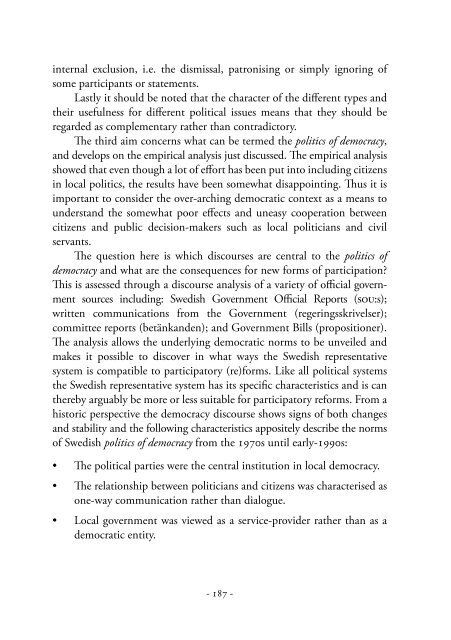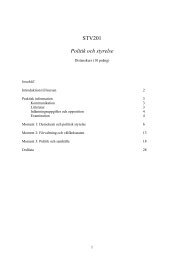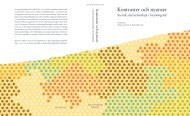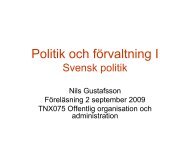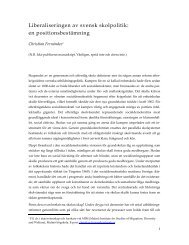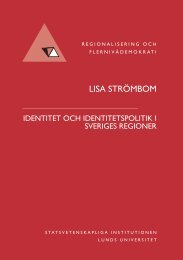Till vilken nytta? Om det lokala politiska deltagandets karaktär ...
Till vilken nytta? Om det lokala politiska deltagandets karaktär ...
Till vilken nytta? Om det lokala politiska deltagandets karaktär ...
Create successful ePaper yourself
Turn your PDF publications into a flip-book with our unique Google optimized e-Paper software.
internal exclusion, i.e. the dismissal, patronising or simply ignoring of<br />
some participants or statements.<br />
Lastly it should be noted that the character of the different types and<br />
their usefulness for different political issues means that they should be<br />
regarded as complementary rather than contradictory.<br />
The third aim concerns what can be termed the politics of democracy,<br />
and develops on the empirical analysis just discussed. The empirical analysis<br />
showed that even though a lot of effort has been put into including citizens<br />
in local politics, the results have been somewhat disappointing. Thus it is<br />
important to consider the over-arching democratic context as a means to<br />
understand the somewhat poor effects and uneasy cooperation between<br />
citizens and public decision-makers such as local politicians and civil<br />
servants.<br />
The question here is which discourses are central to the politics of<br />
democracy and what are the consequences for new forms of participation?<br />
This is assessed through a discourse analysis of a variety of official government<br />
sources including: Swedish Government Official Reports (SOU:s);<br />
written communications from the Government (regeringsskrivelser);<br />
committee reports (betänkanden); and Government Bills (propositioner).<br />
The analysis allows the underlying democratic norms to be unveiled and<br />
makes it possible to discover in what ways the Swedish representative<br />
system is compatible to participatory (re)forms. Like all political systems<br />
the Swedish representative system has its specific characteristics and is can<br />
thereby arguably be more or less suitable for participatory reforms. From a<br />
historic perspective the democracy discourse shows signs of both changes<br />
and stability and the following characteristics appositely describe the norms<br />
of Swedish politics of democracy from the 1970s until early-1990s:<br />
• The political parties were the central institution in local democracy.<br />
• The relationship between politicians and citizens was characterised as<br />
one-way communication rather than dialogue.<br />
• Local government was viewed as a service-provider rather than as a<br />
democratic entity.<br />
- 187 -


